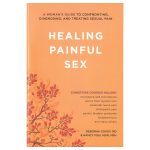Freedom from Pain: What is Dyspareunia & How Does it Affect You?
Let’s start out with this: YOU SHOULD NOT BE EXPERIENCING PAIN DURING SEX (unless you want to). Even though that seems to make sense, a lot of women still believe that pain is something that goes along with intercourse. We’re here to tell you that’s not true. If you are experiencing pain at penetration or regularly at any other time (known as Dyspareunia), it’s time to do something about it.
The physical act of sex sometimes causes pain and not an obvious physical problem. The clinical term for painful intercourse or painful penetration is call Dyspareunia. Dyspareunia is defined as persistent or recurrent genital pain that occurs just before, during or after intercourse. You may have also heard it referred to as vulvodynia. Vulvodynia is another term used to more specifically define pain around the vaginal opening. While many women will have painful intercourse or encounter this at some point in their lives, it should still be addressed!
You deserve to experience pleasure and you are not designed to quietly suffer in pain.
Symptoms of Dyspareunia
- Pain at sexual entry
- Experiencing pain with every penetration, including using a tampon
- Pain during thrusting
- Burning or aching pain
- Throbbing pain lasting for hours
Causes of Dyspareunia
There are many different causes of dyspareunia, which is why it can be a frustrating problem to deal with. Causes can range from a lack of lubrication to Vaginismus to a congenital abnormality. We’ve listed some of the possibilities below (but not limited to them):
- Skin Condition: Any part of your body can suffer from irritation or a skin condition, including your vulva area. Irritation may be leading to pain responses. It could be possible that medication for your skin condition can help with your dyspareunia.
- Infection: Infections such as Candida (Yeast Infection) can cause pain and irritation that cause dyspareunia.
- Vaginal Atrophy: For women over 50 or others who have gone through early-onset Menopause this can be the main problem. Vaginal dryness and vaginal atrophy can cause the vulvar tissue to shrink, lose moisture and cause increased irritation. Fortunately, this could be resolved with a good daily personal moisturizer or lubricant. Your doctor might also recommend estrogen cream or another type of hormone treatment.
- Endometriosis: Endometriosis pain can become worse closer to a woman’s period. She can experience dyspareunia a few weeks before menstruating.
- Vaginismus: This condition occurs when the pelvic muscles involuntarily contract upon intercourse or when inserting a tampon or speculum.
What Should You Do?
Like most things concerning your health, SPEAKING UP is the most important step. There is no need to suffer in silence. Your doctor can’t properly help without knowing what is really going on. This can only start with open communication and being your own advocate. Let’s face it: doctors are busy people! They can’t help unless they hear from you what you’re suffering from. Of course, if you mention pain to your doctor and they minimize, trivialize or disregard it, get a second opinion. Women have experienced countless situations of doctors not hearing them.
Talk therapy can help relieve anxiety and underlying pain caused by past traumas or abuse. You may have to revisit past emotional pain in order to overcome this type of Dyspareunia.
The source of Dyspareunia can vary and could lead you anywhere from a prescription to a talk therapist. Your doctor will need to ask plenty of questions about your pain.
BE SPECIFIC
The more you can identify about your pain, the more you will give to your doctor to narrow down the problem. Be ready to answer questions about location, persistence, type of pain (burning, stabbing, throbbing), when the pain occurs, how long it has occurred and when you first noticed it.
A health care provider who is driven, patient, understanding can help solve the problem. It can be a difficult for a provider to diagnose so find a healthcare practitioner who will take the issue seriously and who will want to find the source of your problem. We encourage you to be your own advocate for your pain and well-being.
In addition to several books about sexual pain, recovery and healing, MedAmour carries products that can be useful for Dyspareunia. However, you should always speak with your health care provider FIRST to determine the cause of your pain.
References
https://www.mayoclinic.org/chronic-pain/art-20044369
https://www.emedicinehealth.com/pain_during_intercourse/article_em.htm
https://www.webmd.com/pain-management/guide/pain-management-maintaining-intimacy#1
https://www.health.harvard.edu/womens-health/painful-sexual-intercourse-dyspareunia
https://www.mdedge.com/obgmanagement/article/66340/dyspareunia-5-overlooked-causes










